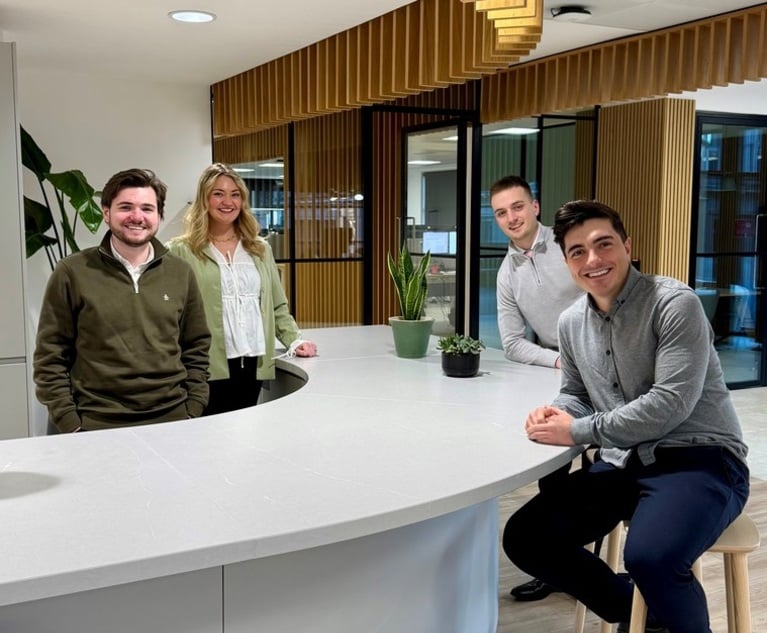The Leaner Look: Why Legal Panels Are Slimming Down
Organisations including Network Rail, the Post Office and Heathrow have slashed the number of law firms on their panel. General counsel explain why.
August 14, 2019 at 07:01 AM
8 minute read
 Trying to slim down: In-house teams are cutting down on panel firms. Credit: Shutterstock
Trying to slim down: In-house teams are cutting down on panel firms. Credit: Shutterstock
"Halved." "Slashed." "Slimmed." A recurrent theme is emerging around legal panel review stories.
The facts are simple. Corporate legal panels are getting smaller, the procurement process is getting tougher, and the way in-house teams approach and work with their legal advisers is evolving, with panels becoming more honed and composed of fewer select law firms.
Companies to have slimmed their rosters in the past couple of years include Network Rail, the Post Office, Heathrow, NFU Mutual, EDF Energy, Kingfisher, The Crown Estate, and Pension Protection Fund, among others.
To understand what's behind this trend and how it impacts law firms, Legal Week spoke to four general counsel who recently trimmed their legal panels.
"It was hard for me to maintain relationships with 23 different firms," says Pension Protection Fund (PPF) director of legal, compliance and ethics Dana Grey.
She adds: "Because of the size of the panel and stream of work, it would be hard for the firms to invest as much into the relationship as they would if they are on a smaller panel where they get more targeted amounts of work."
Last January, PPF slashed its legal panel numbers from 23 firms to six following a six-month procurement process. Grey says the cull was necessary to ensure the selected law firms understood the company's business and objectives thoroughly, were available to meet face to face regularly, and felt more invested in their contract with the company.
"It's the most thorough and extensive exercise we've ever done"
The firms on the reduced roster are Gowling WLG, DWF, Herbert Smith Freehills, Hogan Lovells, Mayer Brown and Osborne Clarke. Grey says the three main criteria for the panel were "quality of service, quality of advice, and consistency of cost".
The firms host half-day workshops that senior PPF staff attend, getting advice on areas such as regulation and project management. They also hold regular meetings so that their lawyers can combine with the company's in-house team, driving collaboration and fostering closer ties.
She adds: "The things we then looked at were: how and who would be providing the service; how we were going to maintain the relationships; and how we were going to keep it relevant to what we do as an organisation."
Come fly with me
Joining PPF in slimming its panel, Heathrow completed its legal panel review earlier this year, cutting its roster from nine firms to seven, with Freshfields Bruckhaus Deringer, Allen & Overy, Pinsent Masons, BCLP, Eversheds Sutherland, Towerhouse and Owen White winning spots.
Heathrow GC and chief of staff Carol Hui says that, while the company did not set out to reduce its legal panel, the process gravitated towards a select few law firms that were "more aligned with our vision and purpose, had better diversity and inclusion elements, focused on sustainability, and had a greater understanding of Heathrow".
Hui adds: "There are good reasons for slimming down. To work with fewer firms means you can build better and stronger relationships with them, making it more meaningful in terms of transactions."
"In looking at value and purpose, we have naturally gravitated towards a smaller number"
Heathrow's Hui believes that the procurement process is now more rigorous and the appointments are more important now, given the reduced line-up. "It's an extension of your organisation," she says, "so it's quite right that people should be put through their paces."
Network Rail's network
Network Rail joined the trend earlier this year, halving its legal panel from six to three. Group GC and company secretary Stuart Kelly says since he first joined the company in 2006 as a legal adviser, the company has worked with a panel of 50 law firms. Since then, this number has progressively dropped from 50 to 26, to 12, to six, and finally to three. The firms that remain are Eversheds Sutherland, Dentons, and Addleshaw Goddard.
Kelly says there were five main reasons for slimming the panel: to make it easier to collaborate; to be able to give a greater volume of work to each firm; to reduce waste; to have a relationship with fewer lawyers, meaning there can be more focus on elements such as individual welfare; and to ensure each firm is working closely with the organisation.
"It took us two years to get to that point – it's the most thorough and extensive exercise we've ever done," says Kelly.
The three firms Network Rail settled on are split across the company's five regions – Dentons covers three regions, while the other two oversee one apiece.
"This means there's very little competition between them," says Kelly, "so we have the ability to compare their performances alongside each other. Comparability is much more important to me than competition. And it means they talk with each other about what is and isn't working in each region."
The panel is running for a five-year term. Kelly says this longer timeframe demonstrates the company's commitment to the chosen firms, once again tapping into the trust element.
Vying for the crown
The Crown Estate is another company that has streamlined its panel, halving numbers across a three-year period. GC and company secretary Rob Booth says: "It's not just about wanting fewer firms, but in looking at value and purpose we have naturally gravitated towards a smaller number."
The two firms on the current panel are Bond Dickinson and Burges Salmon.
"It's about being brave and moving outside your comfort zone, and becoming more efficient."
Booth says The Crown Estate deployed three key criteria in assembling its sleeker panel. The first is competency, as Booth says relationships will never compromise the need for quality advice.
However, unlike Network Rail, competition between panel firms – the second requirement – is crucial, with Booth highlighting "the need to have sufficient competition to get the top performance out of our advisers over time".
The final pillar is "achieving critical mass". Booth explains: "We have a real commitment and belief that we should have enough mandates to reach critical mass – that's the size that gives us a sustainable advantage. The critical mass part has been the key driver of us slimming down our number."
Through this, Booth says the company has created a "value equation" to ascertain the optimum number of law firms for its panel, and suggests that having fewer firms has allowed for "clarity and transparency".
To maintain closer relationships with its panel members, The Crown Estate holds quarterly meetings to create what Booth describes as "an increasingly sophisticated look forward".
The company uses a "panel map" to identify where key partners and key contacts are, and to establish how they might work together. "It's amazing what a difference that makes for law firms to pick up the phone to each other – they can then swap information in a transparent, collaborative space," Booth adds.
"It was more difficult to collaborate with larger numbers"
When asked why companies continue to use such large legal panels, PPF's Grey says she believes it is out of fear.
"It must have stemmed from nervousness about needing advice on random pieces of law," she says. "But people need to realise that if you don't have that capability on your panel, it's okay to go off panel. It's about being brave and moving outside your comfort zone, and becoming more efficient."
Booth believes panel slimming is "about unlocking the collaborative next step".
"Frankly, I think we've all confirmed now that it was more difficult to collaborate with larger numbers," he adds.
This content has been archived. It is available through our partners, LexisNexis® and Bloomberg Law.
To view this content, please continue to their sites.
Not a Lexis Subscriber?
Subscribe Now
Not a Bloomberg Law Subscriber?
Subscribe Now
NOT FOR REPRINT
© 2025 ALM Global, LLC, All Rights Reserved. Request academic re-use from www.copyright.com. All other uses, submit a request to [email protected]. For more information visit Asset & Logo Licensing.
You Might Like
View All
The Merricks-Mastercard Fallout: ‘Defendants Will Be Rubbing Their Hands with Glee’

‘Raises More Questions Than Answers’: Partners Puzzled by Leadership Change at UK Competition Regulator

Trending Stories
- 1Gunderson Dettmer Opens Atlanta Office With 3 Partners From Morris Manning
- 2Decision of the Day: Court Holds Accident with Post Driver Was 'Bizarre Occurrence,' Dismisses Action Brought Under Labor Law §240
- 3Judge Recommends Disbarment for Attorney Who Plotted to Hack Judge's Email, Phone
- 4Two Wilkinson Stekloff Associates Among Victims of DC Plane Crash
- 5Two More Victims Alleged in New Sean Combs Sex Trafficking Indictment
Who Got The Work
J. Brugh Lower of Gibbons has entered an appearance for industrial equipment supplier Devco Corporation in a pending trademark infringement lawsuit. The suit, accusing the defendant of selling knock-off Graco products, was filed Dec. 18 in New Jersey District Court by Rivkin Radler on behalf of Graco Inc. and Graco Minnesota. The case, assigned to U.S. District Judge Zahid N. Quraishi, is 3:24-cv-11294, Graco Inc. et al v. Devco Corporation.
Who Got The Work
Rebecca Maller-Stein and Kent A. Yalowitz of Arnold & Porter Kaye Scholer have entered their appearances for Hanaco Venture Capital and its executives, Lior Prosor and David Frankel, in a pending securities lawsuit. The action, filed on Dec. 24 in New York Southern District Court by Zell, Aron & Co. on behalf of Goldeneye Advisors, accuses the defendants of negligently and fraudulently managing the plaintiff's $1 million investment. The case, assigned to U.S. District Judge Vernon S. Broderick, is 1:24-cv-09918, Goldeneye Advisors, LLC v. Hanaco Venture Capital, Ltd. et al.
Who Got The Work
Attorneys from A&O Shearman has stepped in as defense counsel for Toronto-Dominion Bank and other defendants in a pending securities class action. The suit, filed Dec. 11 in New York Southern District Court by Bleichmar Fonti & Auld, accuses the defendants of concealing the bank's 'pervasive' deficiencies in regards to its compliance with the Bank Secrecy Act and the quality of its anti-money laundering controls. The case, assigned to U.S. District Judge Arun Subramanian, is 1:24-cv-09445, Gonzalez v. The Toronto-Dominion Bank et al.
Who Got The Work
Crown Castle International, a Pennsylvania company providing shared communications infrastructure, has turned to Luke D. Wolf of Gordon Rees Scully Mansukhani to fend off a pending breach-of-contract lawsuit. The court action, filed Nov. 25 in Michigan Eastern District Court by Hooper Hathaway PC on behalf of The Town Residences LLC, accuses Crown Castle of failing to transfer approximately $30,000 in utility payments from T-Mobile in breach of a roof-top lease and assignment agreement. The case, assigned to U.S. District Judge Susan K. Declercq, is 2:24-cv-13131, The Town Residences LLC v. T-Mobile US, Inc. et al.
Who Got The Work
Wilfred P. Coronato and Daniel M. Schwartz of McCarter & English have stepped in as defense counsel to Electrolux Home Products Inc. in a pending product liability lawsuit. The court action, filed Nov. 26 in New York Eastern District Court by Poulos Lopiccolo PC and Nagel Rice LLP on behalf of David Stern, alleges that the defendant's refrigerators’ drawers and shelving repeatedly break and fall apart within months after purchase. The case, assigned to U.S. District Judge Joan M. Azrack, is 2:24-cv-08204, Stern v. Electrolux Home Products, Inc.
Featured Firms
Law Offices of Gary Martin Hays & Associates, P.C.
(470) 294-1674
Law Offices of Mark E. Salomone
(857) 444-6468
Smith & Hassler
(713) 739-1250









